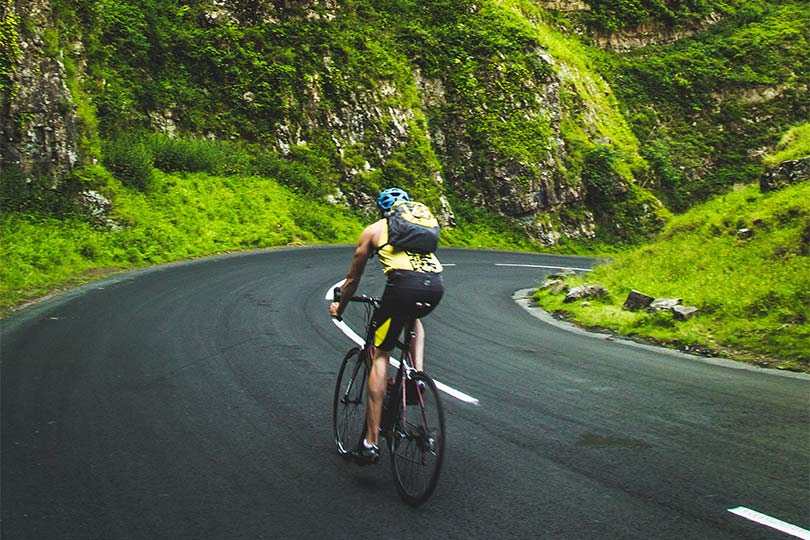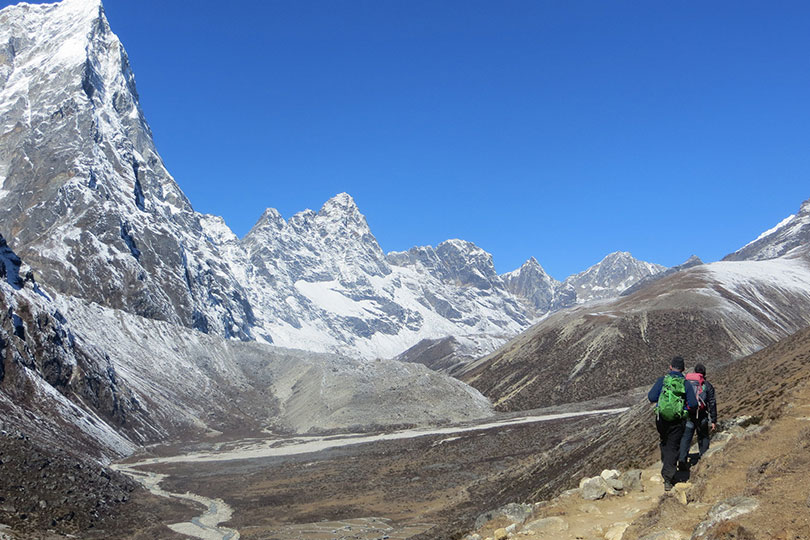Training for Everest Base Camp hike is as important as it is to being healthy and mentally fit for any adventure trip. As easy as it may seem to the seasoned trekkers, there is one question to ponder upon. “How fit must I be to do the Everest Base Camp Trek? Before getting to know the basics of Everest Base Camp training plan, we need to understand one thing. The trek must not be taken lightly as it covers a trekking distance of about 81 miles (130km).

It is a known fact that Everest trail is one of the most popular treks in the world. However, it could be a little intimidating to people with low fitness levels. Nevertheless, it is doable by most people considering the Everest Base Camp difficulty and the appropriate training to undertake. We recommend hikers to get acquainted with some basic tips for high-altitude trekking before you actually attempt one.
- Key to a successful hike
- How much training do I need to be fit for EBC trek?
- What is the level of difficulty on the Everest base camp trek?
- Physical Training And Fitness Required For Everest Base Camp Trek
- Final Words In A Nutshell
-
Useful FAQs for your High Altitude Treks in Nepal
- How fit do I need to be to trek in Nepal?
- How hard is the Everest base camp trek?
- Can I do the Everest base camp trek if I don’t have previous trekking experience?
- How can I prevent altitude sickness during the Everest base camp trek?
- Is acclimatization necessary on the Everest base camp trek?
- Will I lose weight after completing my trek to Everest base camp?
Key to a successful hike
Everest Base Camp training is not enough without a strong determination to last for at least two weeks in the cold mountains. Considering the fact that it is a non-technical hike, it requires no previous mountaineering experience. But, one must not overlook the Everest Base Camp physical fitness requirements. It is in fact, a great challenge for people of all ages and physical conditions. A high level of fitness either before or after the Everest base camp training will guarantee a successful hike. We have witnessed in the past years all sorts of people including old, young, overweight and underweight, complete the spectacular hike.
The key to success however, is the altitude and the body’s acclimatization to the deficiency of oxygen. Although it is quite possible to hike up to Everest base camp with a reasonable fitness level, we recommend training for an enjoyable trip. It is also worth to know the complete packing list for Everest base camp trek as it plays a vital role for a successful trekking adventure.
Other than trainings and right packing list there are a few other things that you will need to consider in order to successfully complete your trek to the Everest Base Camp. Check our “14 Tips for Successful Trek to The Everest Base Camp” for more details.
How much training do I need to be fit for EBC trek?

Since you’ll be walking an average of 9.5 miles (15 km) per day for 5 to 7 hours, it is good to stay prepared for tough days. Not all days will be the same as some days may be easier with no uphill walk at all. It is good to begin with a 45-minute jogging for a few days. However, depending on your fitness level a few months of regular training will bring you to shape. All the training will help build up your fitness level on a gradual move. The basis of your stamina training is first to find your own level of comfort and then push the level one step ahead.
What is the level of difficulty on the Everest base camp trek?
1. Trek duration
Depending on the trekking route, a minimum of 9 days of continuous hiking with a couple of acclimatization days.
2. Trek distance
A minimum of 4 to 4.5 miles of hiking each day while ascending, and at least 9 to 11 miles of hiking while returning from the base camp.
3. Backpack weight
Carrying your own backpack comprising essential items that would weigh around 11 to 15 lbs (5 to 7 kg) during the trek.
4. Trekking altitude
Trekking at altitudes between 2,500 to 5,500m (8,200 to 18,045ft) with up to 30 to 50 % oxygen deficiency in the atmosphere on the entire trek.
Physical Training And Fitness Required For Everest Base Camp Trek
To maintain fitness and stay heathy while trekking in the mountains it is essential to schedule for a basic training. Every individual has his or her own schedule as well as mental and physical abilities. Therefore, it is essential to be physically and mentally prepared to face the severities of trekking in the Everest region. Trekking to the base camp must include several training courses such as cardiovascular and strength endurance, climbing, flexibility, and hiking-specific conditioning.

One of the most important aspects for a successful high-altitude trek like Everest Base Camp Trek, one needs to be in strong physical shape. Although it doesn’t require any technical mountaineering capability, any previous experience would be an advantage. The following elemental things are significant in order to attain a fruitful training course:
- Spend enough time to prepare
- Pick the right acclimatization schedule
- Build up your fitness over a longer period of time, don’t stuff everything
- Never ignore nutritious diet during training
- Reduce training exercises at least one week before departure
- Get sufficient rest before the actual trek
You can review the training sections and types of exercises which needs to be carried out a few months ahead of trekking in the Himalaya. Read below the physical training tips in details and start utilizing resources and schedule your training plan accordingly:
1. Practice with short hikes

There is nothing worse than getting a blister on your toes on the first day of your hike. Practicing short hikes will make your trekking journey perfect as it allows your body to get used to walking long distances. It will allow you to break in your hiking boots and you get to understand about the stress your knees will be getting on the real walk. Hiking is the one thing you can do on your training plan, even if you don’t do the others. Doing at least 3 to 4 short hikes with a minimum duration of 5 to 6 hours without problem will allow you to do your Everest trek comfortably.
2. Cardiovascular Conditioning
Exercise that help to prepare our body deal with oxygen deficiency for a long period of time is a cardio training. It is sometimes also known as an aerobic exercise. This is the first type of training we recommend to all trekkers and it basically stops you from being breathless. For this, we suggest running, walking on a tilted treadmill, doing stair stepping, walking uphill and downhill, or taking aerobic classes.

Biking, swimming and cycling are some other cardiovascular exercises which we can opt. It is also quite helpful to build up endurance when carrying weight packs during training sessions. Getting used to the weights and gradually increasing it while training on uphill walks will make it easier on the actual trek. Three to four training sessions of persistent activity of half an hour each is productive. Four to six aerobic sessions for about an hour each is also useful for doing the Everest Base Camp Trek.
It is fruitful to build up the overall strength, especially in the lower back, abdominal areas, legs and upper back. It is also rewarding that you train with free weights, bodyweight and gym exercises, or a backpack.
3. Strength Conditioning
Although it is not as important as aerobic or cardiovascular conditioning, firming up the leg muscles will help increase enjoyment on the trek. So, we recommend a training plan that combines strength training while going for a trek to Everest base camp. 5 to 6 hours of walking with a backpack on your back means that each part of your body has to be physically strong. It can be attained when you include lift training along with aerobic exercises. For building up strength in your legs, we recommend the following:
- Step-ups
- Squats
- Pull-ups
- Bench presses
- Push-ups
- Leg curls (front and reverse)
- Lunges
- Deadlifts
- Overhead presses

Doing the exercises with the correct technique is very important because doing it incorrectly can harm you. There is no doubt that legs are the most significant parts while exercising. Nevertheless, the upper parts of the body also need to be conditioned. And this is because, you will be carrying you’re your personal stuff and gears all the way up to the base camp. We recommend the following exercises so that it helps strengthen the upper body:
- Sit-ups
- Shoulder presses
- Kettle-bell rows
- Back & shoulder fly
On the training process, you will need to gradually shift focus on building strength, endurance, mental as well as physical energy. It is very important that you fluctuate with the use of weight during each phase of training. Also, it is vital that you get proper rest intervals between each set of the exercise you do. Maintaining proper form is equally important while undertaking any of the training phase to prevent injuries or strains.
4. Mental Conditioning
Mental stamina is usually disregarded by many climbers, but the fact is that it is just as important as other trainings. Some days on the EBC trek are comparatively tough, thus one needs to have the right attitude. Getting mentally trained, however is not an easy task. As a matter of fact, mental stamina is the only thing that you will have remaining when your body is physically exhausted during the long walks.

On the other hand, imagination is an influential channel here. When you exercise, it is advantageous if you pretend doing the base camp trek and presume that you are already in the mountains. Allowing your training partner push you off your limit while exercising will surely help to become mentally resilient. A half marathon or a full marathon is also a great fitness goal that will help with your fitness and mental grit. When you are able to complete this, then you will surely be able to do EBC trek with ease.
On the bottom line, it is just not cardiovascular conditioning or strength conditioning that will help you prepare. With the right physical training, correct attitude and strong mental determination, one can have a safe and successful trekking experience.
5. General Conditioning For Everest Base Camp Trek
Putting up all together, here’s what you need to know about general conditioning for doing the Everest Base Camp trek:
- Back to back training that includes hiking with a targeted weight on your back.
- Climb at least 1,000m with a backpack weighing at least 12 to 18 kg spending a minimum of 2 to 3 hours.
- Increase the weight gradually on a daily basis for a week or two.
- When training indoors, work up gradually with a heavy pack and also heavy boots or hiking shoes on.
- Use a step-mill machine which looks like a moving staircase when you are exercising in a gym.
- If you are in an area that has no small hills or mountains, you will have to add in some more of the gym exercises.
- Listen closely to your body during the training phase by including at least one recovery day per week.
- On the final week of training, gradually reduce the intensity of your exercise procedures so that you get time for rest and prepare mentally as well as physically.
- Overall, you will need a training spell of anything between 3 to 5 weeks before you go out for the actual hike.

There are few other things apart from the basic training and exercises you need to know. These will help you keep hale and hearty on the entire trekking duration. Also, it is helpful in understanding the effects of altitude sickness. Adopting a slow and steady pace on the trail and resting properly at time intervals are the finest tactics to avoid altitude sickness.
Important tips to avoid altitude sickness during Everest Base Camp Trek
- Try to drink at least 3 to 4 liters of water on each trekking day.
- Refrain from any alcoholic beverages and smoking during the trek.
- You need to take preventive medicines whenever it is absolutely necessary – don’t ignore that.
- While climbing to higher elevations, hike in smaller increments rather than pushing much higher.
- Always make sure to sleep in lower elevations even if you are hiking higher on a day.
- Lastly, pick only the reputed trek operator and/or guide who doesn’t fail to assist you in case of any emergency on the mountains.
Final Words In A Nutshell
Everest base camp trek being one of the most popular treks in the world, is manageable to most people. The only condition required is a good fitness level and a highly positive attitude to last for at least two weeks of hiking at high altitudes. The only challenging factor on the EBC trek is evidently the altitude acclimatization for which training for few weeks will help overcome the challenge. With our training plan as described above, trek to Everest base camp can become an incredible experience. Having said that, getting your cardiovascular system to serve at its best, the trek becomes increasingly worthwhile.
Useful FAQs for your High Altitude Treks in Nepal
How fit do I need to be to trek in Nepal?
The most challenging part of trekking in Nepal is the altitude, which is something that we can really prepare well ahead of trekking. For a short trek like Annapurna Poon Hill Sunrise Trek, it does not require a previous hiking experience. However, if planning to do longer duration trekking above 3,000 m / 9,843 ft., like Everest Base Camp trek or Annapurna Base Camp trek, it is required that you are in good physical and mental state of fitness. If you can walk about 10-12 km (6-8 mi) per day without any trouble, then probably you are fit enough. For novice climbers, a pre-training course is required before the start of the trip.
For preparing yourself for the climb, we recommend regular exercise at least 2 months before your arrival in Nepal. You may begin jogging or cycling, stretching and toning exercises, walking up and down the stairs or even walking few hours in a day.
How hard is the Everest base camp trek?
Everest base camp trek is a moderately demanding trek that does not require any technical expertise of mountaineering. It is basically a long hike up to the altitude of 5,364m/17,599ft. As such, the trek is exhausting only because of its duration and the altitude gain across diverse terrains. Training at least 3 to 4 weeks prior trekking will help overcome the arduous moments at high elevations.
Can I do the Everest base camp trek if I don’t have previous trekking experience?
Absolutely, yes. You can do the Everest base camp trek with us provided that you contact us on time so that we can organize few basic training sessions for you. We will need to know about your health history and your daily lifestyle as well. Contacting us at least 3 months prior to the trek date, we will be able to advise you on the required trainings. Knowing your health history, we may also decline your interest for doing the trek, but this is very rare.
How can I prevent altitude sickness during the Everest base camp trek?
There are few things to keep in mind if you are planning to hike to Everest base camp without facing any troubles related to altitude sickness. Following the important tips to avoid altitude sickness during the EBC trek is very helpful. The first thing is to ascend slowly with proper rest and enough acclimatization. Secondly, you need to drink plenty of water and fluids, and stay hydrated at all times. Eating sufficiently and balanced food is one way to stay away from being hit by altitude sickness.
Next, you need to be head-strong and mentally prepared. The most important thing, however, is to train your body to cope with uphill hikes with plenty of aerobic exercises and gym workouts.
Is acclimatization necessary on the Everest base camp trek?
Acclimatization means getting used to a new climate or to new conditions. On this trek, getting acclimatized needs resting body at lower elevations so as to adapt to the environment. To prevent getting altitude sickness, acclimatization is an absolute necessity for all trekkers and climbers. You never know, because anybody regardless the age, physical condition or body features can be a victim of Acute Mountain Sickness (AMS).
Will I lose weight after completing my trek to Everest base camp?
On this trek, you will be eating healthy food, whatever is easily available at the teahouses. While it is a common phenomenon for trekkers to lose about 7 to 10% of their weight, some manage to eat and sleep well to compensate the loss. On our part, we encourage all climbers to eat as much as possible for which we provide a perfectly balanced diet during the entire trip to the base camp.

A leading adventure & tour operator in the Himalayas since 1992, Himalayan Glacier Adventure & Travel Company® is the #1 guiding adventure travel company on Mount Everest Base Camp and beyond with 98% success rate. Each of our holidays is truly a tailor-made package which we design for all ages, groups, families & solo travelers.







I am interested in Everest base camp Trek , can you please let me know the details about the Trek.
Thank you Madhusundan for taking interest on Everest base camp trek. As we have many well designed itineray for EBC so please check this Everest Trek page that will help you alot.